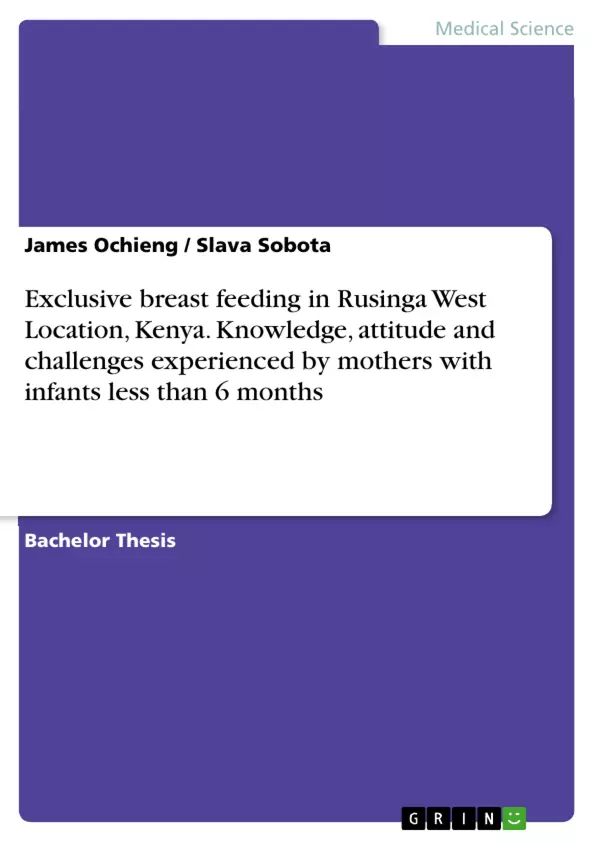This study aimed at assessing the knowledge, attitude and identifying the challenges experienced during the practice of exclusive breastfeeding among mothers of infants less than 6 months in Rusinga West Location. This study had three specific objectives namely, to assess mother`s knowledge on exclusive breast feeding, to determine mother`s attitude towards exclusive breast feeding and to identify challenges faced by mother`s during exclusive breast feeding practice.
A descriptive cross-sectional study design was utilized. The study targeted mothers with infants less than six months of age in the location. Data was collected by administering structured questionnaires with closed and open ended questions to the targeted respondents. Data was entered into Microsoft Excel and analyzed using descriptive statistics and presented using tables and graph.
A total of 84 respondents participated and the study findings showed that majority of the respondents 98%, (n=82) had heard of exclusive breast feeding and knew what it mean. Half of the respondents, 50%, (n=42) said they had experience difficulties while breast feeding and half of the respondents 50%, (n=42) also said they have not experienced any difficulty while breast feeding. It is worth noting that majority of the respondents still face challenges such as baby refusal to breast feed, inadequate breast milk, breast tenderness, pain during breast feed and sore nipples.
Inhaltsverzeichnis (Table of Contents)
- ABSTRACT
- BACKGROUND INFORMATION
- PROBLEM STATEMENT
- JUSTIFICATION OF THE STUDY
- METHODOLOGY
- Study design
- Study area
- Study population and target population
- RESULTS
- Distribution of respondents by age
- Age of the infants
- Knowledge on exclusive breast feeding
- Source of information on exclusive breast feeding
- View on the duration of exclusive breast feeding
- Position of the baby during breast feeding
- Challenges experienced during breast feeding
- Problems encountered during breast feeding
- Alternative means when experiencing breast feeding difficulties
- DISCUSSION
- Demographic information
- Knowledge on exclusive breast feeding
- Difficulties experienced during breast feeding
- Effects of the problems encountered
- Conclusion
- Recommendations
- REFERENCES
Zielsetzung und Themenschwerpunkte (Objectives and Key Themes)
This study examines the knowledge, attitudes, and challenges encountered by mothers of infants under six months old during exclusive breastfeeding practices in Rusinga West Location, Kenya. The objectives are to assess mothers' knowledge of exclusive breastfeeding, determine their attitudes towards it, and identify the challenges they face. The study utilizes a descriptive cross-sectional design and collects data through structured questionnaires.
- The knowledge and attitudes of mothers towards exclusive breastfeeding.
- The challenges experienced by mothers during exclusive breastfeeding.
- The impact of these challenges on infant health and breastfeeding practices.
- The role of community health workers and other resources in promoting exclusive breastfeeding.
- The potential interventions for addressing the challenges and improving breastfeeding rates.
Zusammenfassung der Kapitel (Chapter Summaries)
- Abstract: Provides an overview of the study's purpose, methods, findings, and key takeaways. It highlights the prevalence of exclusive breastfeeding knowledge and the challenges mothers face.
- Background Information: Defines exclusive breastfeeding and highlights its health benefits for infants. It also discusses the global and Kenyan context of breastfeeding practices, emphasizing the need for interventions to improve rates.
- Problem Statement: Explains the existing challenges related to exclusive breastfeeding in Kenya, citing statistics on water and other liquids offered to infants and the prevalence of bottle feeding.
- Justification of the Study: Explains the importance of exclusive breastfeeding for reducing infant mortality rates and achieving the Sustainable Development Goal 3. It emphasizes the need for research to inform interventions and improve maternal and child health.
- Methodology: Describes the study design (descriptive cross-sectional), study area, and the target population (mothers with infants under six months in Rusinga West Location).
- Results: Presents data on mothers' knowledge, attitudes, and challenges related to exclusive breastfeeding. It includes statistics on respondents' ages, knowledge of exclusive breastfeeding, source of information, challenges experienced, and alternative practices used.
- Discussion: Analyzes the results and discusses the implications of the findings. It explores the factors influencing mothers' knowledge and attitudes towards exclusive breastfeeding, the impact of encountered difficulties, and potential interventions for improving breastfeeding practices.
Schlüsselwörter (Keywords)
The main keywords and focus topics of this study are exclusive breastfeeding, infant health, maternal health, infant and young child feeding, knowledge, attitude, challenges, community health, interventions, and Kenya. The study explores the factors influencing exclusive breastfeeding practices, highlighting the importance of addressing knowledge gaps, overcoming challenges, and promoting positive attitudes towards this essential infant feeding practice.
Frequently Asked Questions
What is the definition of exclusive breastfeeding?
Exclusive breastfeeding means that an infant receives only breast milk for the first six months of life, with no other solids or liquids, including water, except for oral rehydration salts, drops, or syrups consisting of vitamins or medicines.
What were the main findings of the study in Rusinga West?
The study found that while 98% of mothers were aware of exclusive breastfeeding, 50% experienced significant difficulties, such as inadequate milk supply or physical pain.
What are the most common challenges faced by breastfeeding mothers?
Mothers reported challenges including baby refusal to breastfeed, sore nipples, breast tenderness, and the perception of having inadequate breast milk.
Why is exclusive breastfeeding important for infant health?
It provides essential nutrients, strengthens the immune system, and significantly reduces the risk of infant mortality and illnesses like diarrhea and pneumonia.
How can community health workers support breastfeeding?
They play a vital role in educating mothers on proper positioning, managing common breastfeeding problems, and providing emotional support to improve breastfeeding rates.
- Quote paper
- James Ochieng (Author), Slava Sobota (Author), 2017, Exclusive breast feeding in Rusinga West Location, Kenya. Knowledge, attitude and challenges experienced by mothers with infants less than 6 months, Munich, GRIN Verlag, https://www.grin.com/document/550022



